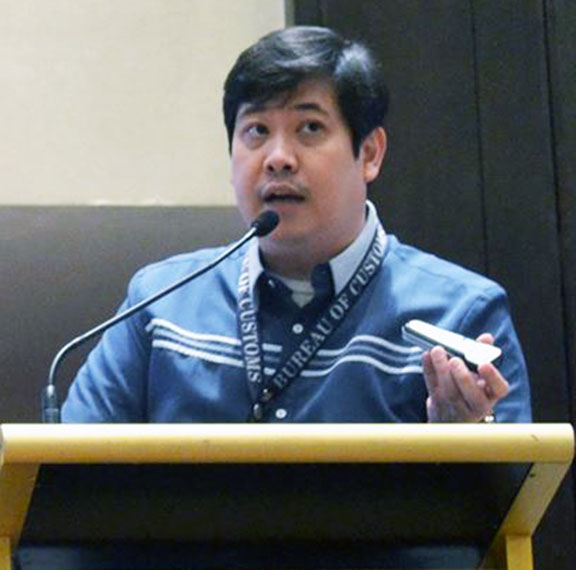
STAKEHOLDERS can expect faster and more streamlined processing at the Bureau of Customs-Ninoy Aquino International Airport (BOC-NAIA), as the collection district lays down plans to further improve its operations and services, according to district collector Atty. Vincent Philip Maronilla.
“We’re supposed to be a port that caters to express shipment so everybody should expect express processing as well, but not to compromise the other mandates of the bureau which is to ensure that we collect the proper revenue and of course we don’t allow prohibited items to come in,” Maronilla told Asia Customs & Trade on the sidelines of the NAIA Customs and Business Dialogue organized by Asia Customs & Trade and PortCalls on February 13 in Manila.
The district collector, who took office last January, said that in his initial evaluation, he is not satisfied with some of the processing times, adding they can still be reduced to a day or even less.
He noted that unlike in seaports, shipments delivered through air are already charged storage fee when they arrive.
Maronilla, in a presentation during the dialogue, disclosed some of the changes he has made so far at BOC-NAIA to further improve processes.
He said items needing clearance from the District Collector’s Office (DCO) have been reduced to only two categories from the previous seven. These two categories only cover aircraft parts and ship spare, as well as guns, gun parts, ammunition and explosives.
He has also ended the need to seek clearance from the DCO for requests to process under the informal entry. He said he has delegated such task to special deputy collectors of the different composite assessment units of BOC-NAIA.
Similar to what he did when he was district collector of Manila International Container Port, Maronilla initiated monthly dialogues with top 20 importers at NAIA. Similar dialogues with other stakeholders will likewise be held regularly in a bid to streamline processes.
Revival of VCRC
Moving forward, Maronilla said, there are plans to revive the Valuation and Classification Review Committee (VCRC) to settle valuation and classification disputes. Maronilla noted that the law mandates all port districts to organize a VCRC.
Also planned is a time release study that will identify and address processes that need improvement, Maronilla said.
He noted that as a port, BOC-NAIA is unique in that processes are conducted in different composite assessment units at each warehouse, resulting in each unit, while implementing the same general principles of cargo clearance, making adjustments and trying other procedures to facilitate cargo release.
Standard procedures
He noted that Customs Commissioner Isidro Lapeña recently became aware of this setup and now wants all NAIA processes streamlined. A general customs order is expected to be issued by the Office of the Commissioner (OCOM) soon.
Maronilla said he intends to seek removal of redundant and/or unnecessary cargo clearance procedures and processes.
Another plan is ensuring enough manpower so that BOC-NAIA can perform its mandate effectively. Maronilla noted his district is short on manpower, a concern he has communiated to OCOM.
He said additional manpower for the Arrival Division will be coming, while most of the personnel from that division will be promoted to the Assessment Division.
BOC-NAIA will also fast-track the disposition of overstaying cargoes, which Maronilla said he saw a lot of when he visited different warehouses.
Charges of warehouses
The collection district also plans to work on a memorandum of understanding with warehouse operators about standardizing their fees.
Maronilla acknowledged this “is going to be a challenge” since warehouses are run privately with their own set of fees and charges. BOC-NAIA will try to standardize some of the charges to help minimize some unwarranted expenses.
He noted that cooperation among these warehouses may be possible since they are accredited by BOC as customs bonded warehouses.
On the service side, Maronilla said BOC will ensure that x-ray machines for hand-carried baggage are installed and operational by March 2018.
BOC-NAIA will also establish a feedback mechanism for stakeholders’ suggestions and grievances, so that the collection district can get updated on process loopholes and look at areas for further improvement.
Asked what stakeholders can do to help BOC-NAIA operations, Maronilla said stakeholders should “try to avoid the common issues such as inconsistencies in information provided in their documents.”
He also expects stakeholders to provide the right feedback “if we’re getting things [done] the right way” and “if we’re not, we also expect them to tell us first so that we can remedy the situation.”
“Needless to say we expect everybody to pay the right duties and taxes.”- Text and photo by Roumina Pablo








